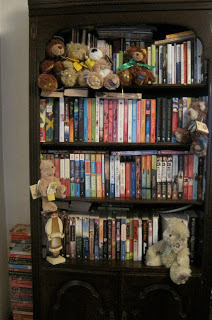Should Christians Read Secular Fiction?

In the 16 years since I've been a Christian, Christian fiction has grown at a rapid rate. After giving my heart to Christ in 1996, I asked Him for quality Christian romances. As a happily ever after girl, romances are my first picks to read. Having read secular fiction for most of my life, I'm not a stranger to the stronghold some secular fiction can have on a reader. Some of my favorite authors write secular fiction.
But, in my baby faith, I didn't want to fill my mind with things that went against God's Word. 7 months later, the Love Inspired line debuted. God answered my prayer. And that's the reason I wanted my first novel to be published by Love Inspired.
When I became a new Christian, Christian fiction seemed limited (at least to me) to prairie romances and Grace Livingston Hill novels. I'm not dissing either of those, but I wanted more. One of the first Christian fiction authors I read and adored is Dee Henderson. Her O'Malley series and Uncommon Heroes series still sit on my shelf.
What sets Christian fiction apart from secular fiction is the belief in Jesus Christ and the faith element woven throughout the stories. Christian fiction keeps the language clean, violence toned down and the bedroom door closed. Intimate scenes between characters are male and female and sex happens with a husband and wife, but behind closed doors. Christian fiction focuses on the emotional impact of intimacy rather than the physical.
I'm not saying all secular fiction is graphic or violent. That's not the case at all. Readers can pick up secular sweet romances that are closely related to Christian fiction, but those sweet romances limit the faith element if it's mentioned at all. And many Christians like Debbie Macomber write for secular publishers.
I still read some secular fiction because, as an author, I need to be aware of what is selling in the secular publishing industry. Some of those secular trends spread into the Christian publishing industry. Speaking only of myself, I've chosen to be more selective about the secular fiction I read. I had a couple of favorite authors whose books I chose to stop reading because the content disregards God in a hostile, negative way or the language and sex scenes are too graphic.
I believe lumping all secular fiction into a "no-no" pile is a mistake. Each reader needs to follow her own convictions about the novels she reads. I've chosen to let go of those favorite authors whose content violates my belief system. For me, those books create a wedge in my relationship with God. That's when I know I need to say no.
Your Turn: Do you feel Christians should read only Christian fiction? Why or why not?
Published on May 16, 2012 04:59
No comments have been added yet.



